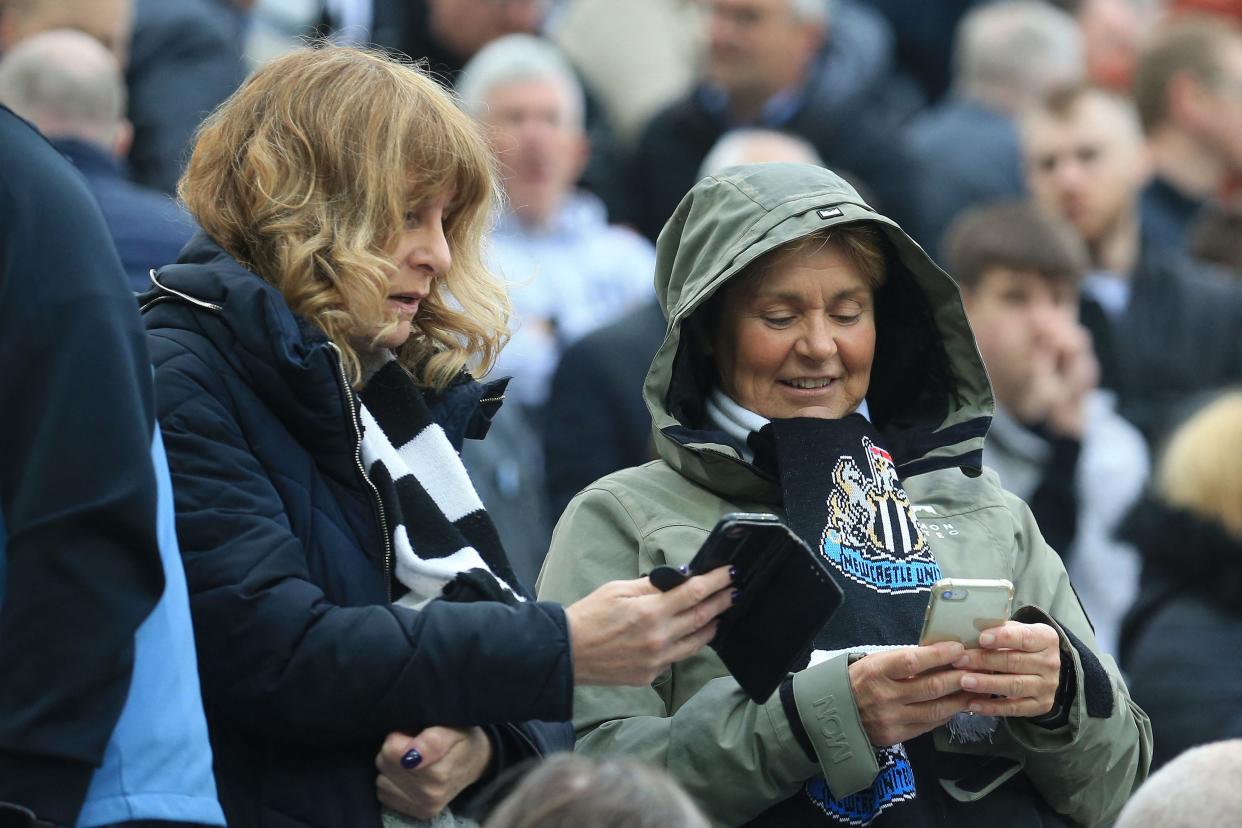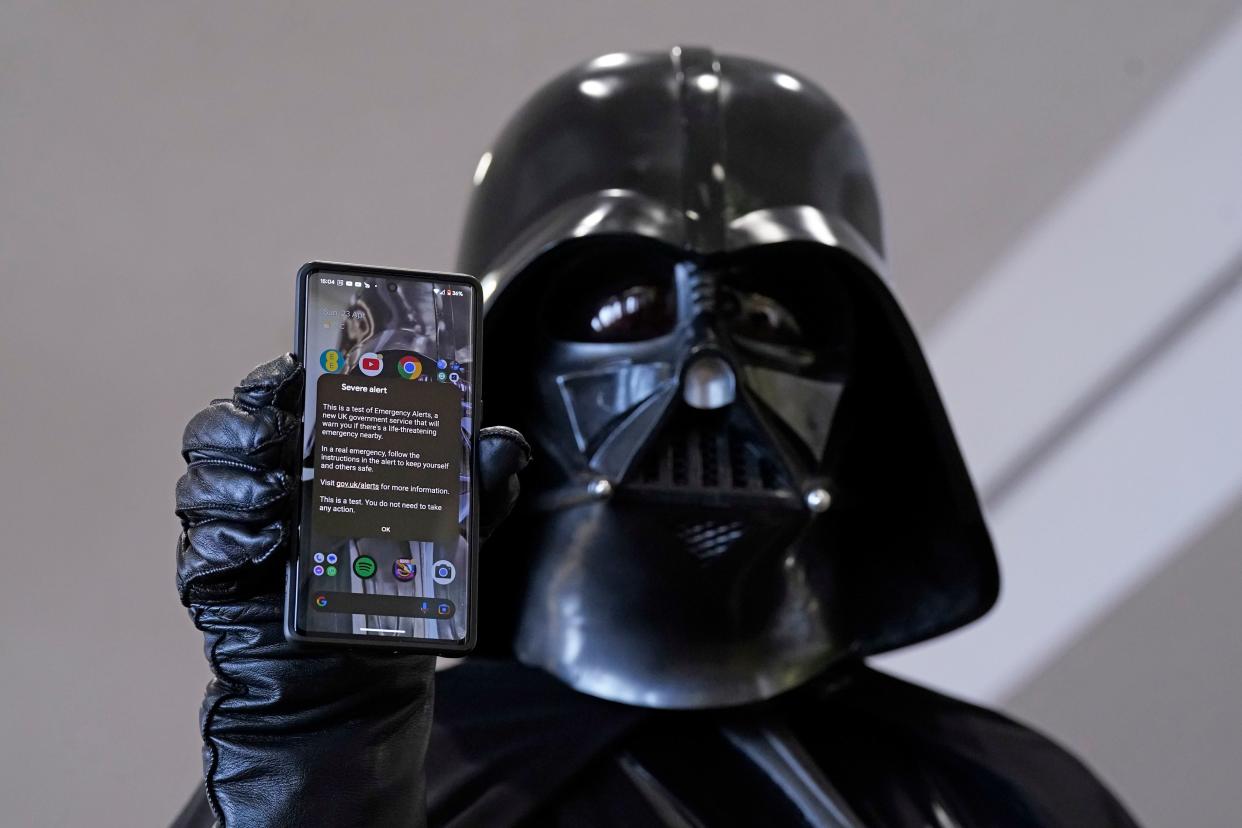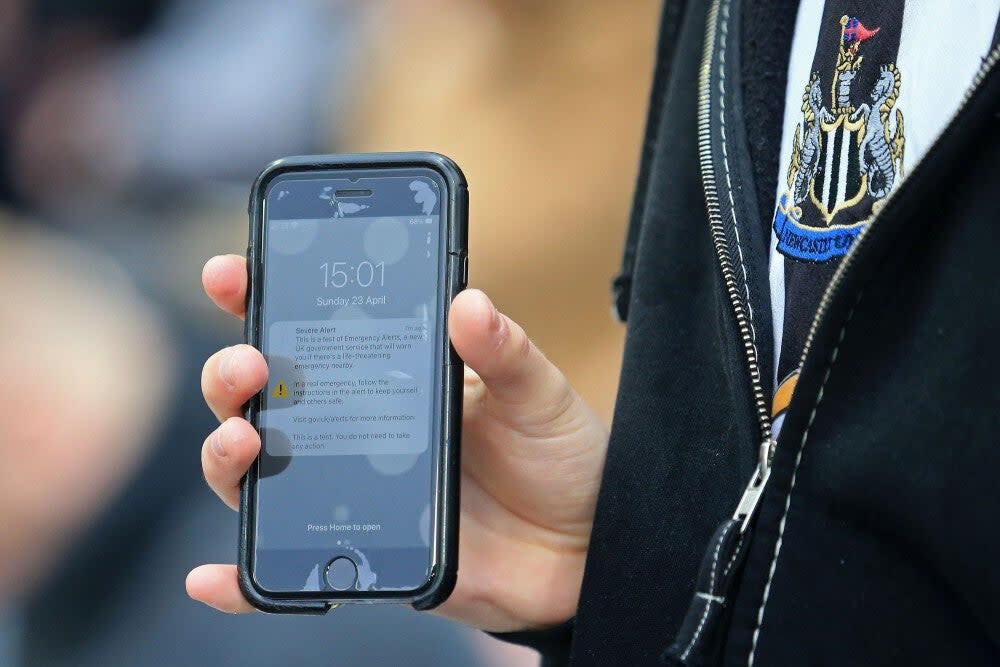Emergency alert test – live: Government reveals why phone users received alarm at different times
Millions of people across the country received the first-ever nationwide test of the government’s new emergency alert system today.
While the alert was scheduled to go out at 3pm, many mobile phone users complained that they received the alert at 2.59pm – startling or scaring them because it went off earlier than expected.
The Independent understands it happened because the alert had to go through different infrastructure used by mobile operators – which don’t all operate at the same speed.
A government source said they always expected it to be “around 3pm” because of the differences in the operators’ networks.
Meanwhile, some Britons said they received the alert after 3pm, while others did not receive it at all.
Customers on the Three mobile phone network were among those to report not receiving the communication test.
In a statement posted on Twitter, the company said it is aware a number of customers did not receive the alert, and it is working with the government to prevent this in the future.
The Cabinet Office said it would be reviewing the outcome of the UK-wide test of the new emergency alert system.
Key Points
Millions to receive emergency alert text messages at 3pm
‘This sound could save your life,’ claims government minister
How to turn off the emergency alert on your phone
‘Ignore at all costs’: Warning issued over potential scams
Emergency alert goes off minute early for some - and not at all for others
Government reveals why phone users received alarm at different times
Government reveals why phone users received alarm at different times
17:40 , Martha Mchardy
Millions of people across the country received the first-ever nationwide test of the government’s new emergency alert system today.
While the alert was scheduled to go out at 3pm, many mobile phone users complained that they received the alert at 2.59pm – startling or scaring them because it went off earlier than expected.
The Independent understands it happened because the alert had to go through different infrastructure used by mobile operators – which don’t all operate at the same speed.
A government source said they always expected it to be “around 3pm” because of the differences in the operators’ networks.
Meanwhile, some Britons said they received the alert after 3pm, while others did not receive it at all.
Customers on the Three mobile phone network were among those to report not receiving the communication test.
In a statement posted on Twitter, the company said it is aware a number of customers did not receive the alert, and it is working with the government to prevent this in the future.
The Cabinet Office said it would be reviewing the outcome of the UK-wide test of the new emergency alert system.
Martha McHardy reports:

Emergency alert: Why did phone users get test at different times
Why did I get an emergency alert on my phone and what is it for?
04:03 , Sravasti Dasgupta
Millions of phones across the UK sounded with a siren on Sunday as part of a test for a new national emergency alert system.
The loud alarm was planned to ring at 3pm on all devices that were using 4G and 5G networks in the UK.
The alert rang for 10 seconds and displayed a message notifying phone users that no action was needed in response to the test.
Here’s all you need to know about the emergency alert on your phone:

Why did I get an emergency alert on my phone and what is it for?
ICYMI: Emergency government alert goes off across the UK amid reports of delays
02:00 , Martha Mchardy
Government releases statement after first ever emergency alert test
01:00 , Martha Mchardy
The government has released a statement after millions of people across the country received the first-ever nationwide test of the government’s new emergency alert system today.
A UK government spokesman said: “We have effectively completed the test of the UK-wide Emergency Alerts system, the biggest public communications exercise of its kind ever done.
“We are working with mobile network operators to review the outcome and any lessons learned.”
Watch: Moment emergency alert test goes off at London Marathon
00:00 , Martha Mchardy
Voices: I’m a survivor of domestic abuse – here’s why the government’s emergency alert poses a threat
23:00 , Martha Mchardy
My abuser prevented me from using a phone, and I know that if he’d ever caught me using a secret phone, there would have been severe repercussions.
Read the full story:

Opinion: Why today’s emergency alert is dangerous for domestic abuse victims
Review announced into emergency alert system
22:00 , Martha Mchardy
A review will be conducted to find out why some mobile phones did not receive the test of a new national emergency alert system on Sunday.
The Cabinet Office said the “vast majority of compatible phones” received the alert as part of what was said to be the biggest public communications exercise carried out in the UK.
But the Government department said it was aware that the 10-second alarm and message notification was not delivered to some mobile phones.
Customers on the Three mobile phone network were among those to report not receiving the communication test.
The network provider said it would be working with the UK Government to understand what had happened.
Three responds after phone users complain they did not receive emergency alert
21:30 , Martha Mchardy
In a statement, a Three spokesperson said: “We are aware that a number of customers have not received the test alert.
“We are working closely with the government to understand why and ensure it doesn’t happen when the system is in use.”
Why did some people get the emergency alert one minute early?
21:00 , Martha Mchardy
While the alert was scheduled to go out at 3pm, many mobile phone users complained that they received the alert at 2.59pm – startling or scaring them because it went off earlier than expected.
The Independent understands it happened because the alert had to go through different infrastructure used by mobile operators – which don’t all operate at the same speed.
A government source said they always expected it to be “around 3pm” because of the differences in the operators’ networks.
Voices: This is why I’m worried about today’s unprecedented emergency alert
20:30 , Martha Mchardy
For women in this situation, their phone, which they once considered a lifeline, could in fact be their enemy, writes Alexis Strum.

Opinion: This is why I’m worried about today’s unprecedented emergency alert
What is the emergency alert system for?
20:00 , Martha Mchardy
The system is intended to be used in life-threatening situations including flooding and wildfires but some Britons have now raised concerns that the alerts would not be a success given a large proportion of people did not receive it.
The message was sent to 4G and 5G mobile phones, with sound and vibration for up to 10 seconds.
Phone users were prompted to acknowledge the alert by swiping or clicking the message before being able to continue using their device.
Speaking before the test, Deputy Prime Minister Oliver Dowden conceded the drill could be “annoying”, but that it had the potential to save people’s lives once rolled out.
He told Sky News that the trial run was a “bit like when the fire alarm goes off at work”.
“It’s a bit irritating at the time but in the future people could be grateful for it because in a real emergency, this could be the sound that saves your life,” he said.
The Cabinet minister denied the new system was an example of nanny state interference, telling the BBC he did not accept “that characterisation”.
How to turn off the emergency alert on iPhone and Android
19:32 , Martha Mchardy
On an iPhone, open up the Settings app and type “emergency alerts” in the search bar. That should bring up the option to turn off “Severe alerts” and Emergency alerts”.
On an Android device, once again go to the settings app and search for emergency alerts. The wording of the switch might depend a little on what version you are using, but will usually be something like “emergency alerts”, and have the option to turn it off.
Devices that are switched off, connected to WiFi only, or using a 2G or 3G network will not receive the alert. It also requires more recent operating systems, though any device that has received updates from the last few years should be compatible.
Watch: Emergency government alert goes off across the UK amid reports of delays
19:00 , Martha Mchardy
Emergency alert ‘could be the sound that saves your life’, says government minister
18:30 , Martha Mchardy
The emergency alert “could be the sound that saves your life”, said deputy prime minister Oliver Dowden.
Speaking before the test, Deputy Prime Minister Oliver Dowden conceded the drill could be “annoying”, but that it had the potential to save people’s lives once rolled out.
He told Sky News that the trial run was a “bit like when the fire alarm goes off at work”.
“It’s a bit irritating at the time but in the future people could be grateful for it because in a real emergency, this could be the sound that saves your life,” he said.
The Cabinet minister denied the new system was an example of nanny state interference, telling the BBC he did not accept “that characterisation”.
People who do not wish to receive future alerts will be able to opt out using their device settings but officials hope the life-saving potential of the messages means users will keep them on.
Error in Welsh emergency alert text
17:59 , Martha Mchardy
The first-ever nationwide emergency alert was sent to millions of people across the country today.
However, the alert sent to people living in Wales included a language error.
For the words “others safe”, the message read “eraill yn Vogel”, despite the fact there is no letter V in the Welsh language. The message should have read “eraill yn ddiogel”.
The UK government said the mistake was down to a “technical error”.
A UK government spokesperson said: “A technical error caused one word in the Welsh language version of the emergency test alert to be misspelt.
“The fact that this occurred in a test alert will mean we can rectify it in future.”
Awkward moment BBC newsreader’s interview interrupted by emergency alert test live on air
17:49 , Martha Mchardy
A BBC newsreader was forced to contend with the government’s 10-second emergency alert test going off early mid-interview.
Text messages were sent to millions of 4G and 5G mobile phones at 3pm on Sunday, prompting an alert to appear on the screen and an alarm to sound, in a trial intended to be used to warn people of local and national risks such as flooding or terror attacks.
While millions received the alert, many did not, while others were jarred to hear the alarm sound either 10 minutes too late or slightly too early.
The latter situation appeared to befall BBC News journalist Richard Preston as he was discussing the test with the chief of the UN Office for Disaster Risk Reduction, Loretta Hieber Girardet.
The presenter – who had asked Ms Girardet whether she thought the goverment had done a sufficient job of advertising the test and its purpose – gave a wry smile to viewers as he heard the alarm sound and reached down to his side as if to check whether it was emanating from his own device.
Andy Gregory reports:

Awkward moment BBC newsreader’s interview interrupted by emergency alert test
Small number unable to make or receive calls since emergency alert
17:30 , Martha Mchardy
A small number of people have taken to social media to flag that they have not been able to make or receive calls since the 3pm alarm went off on their device.
The Cabinet Office stated that engineers had not spotted a trend of phone functions failing to work afterwards, but said officials were in the early stages of analysing the results of the trial run.
Revealed: Reason why some Britons received emergency alert text early
17:00 , Martha Mchardy
Many mobile phone users complained that they received the emergency alert at 2.59pm – startling or scaring them because it went off earlier than expected.
The Independent understands it happened because the alert had to go through different infrastructure used by mobile operators – which don’t all operate at the same speed.
A government source said they always expected it to be “around 3pm” because of the differences in the operators’ networks.
In pictures: nation reacts to emergency alert test
16:52 , Martha Mchardy






Emergency alert: Three responds after phone users complain they did not receive test
16:43 , Martha Mchardy
Millions of phones across the UK sounded with a siren on Sunday as part of a test for a new national emergency alert system.
Although the loud alarm was planned to ring at 3pm on all devices that were using 4G and 5G networks in the UK, some phone users complained that they did not receive the alert.
The alert rang for 10 seconds and displayed a message notifying phone users that no action was needed in response to the test but users from the Three network, one of the largest in the UK, questioned why they did not receive the siren.
In a statement, a Three spokesperson said: “We are aware that a number of customers have not received the test alert.
“We are working closely with the government to understand why and ensure it doesn’t happen when the system is in use.”
Thomas Kingsley reports:

Emergency alert: Three responds after phone users complain they did not receive test
Watch: Emergency alert test goes off at King's Cross
16:33 , Martha Mchardy
Cabinet Office to review emergency alert system after some did not receive alert
16:32 , Martha Mchardy
The Cabinet Office said it would be reviewing the outcome of the UK-wide test of the new emergency alert system after some Britons said they did not receive the alert today.
The department said that, while the vast majority of compatible phones received the alert, officials were aware that a “very small proportion of mobile users on some networks did not receive it”.
It said that would be looked into as part of the review of Sunday’s test.
A UK Government spokesman said: “We have effectively completed the test of the UK-wide Emergency Alerts system, the biggest public communications exercise of its kind ever done.
“We are working with mobile network operators to review the outcome and any lessons learned.”
Three Mobile admits some did not receive emergency alert
16:29 , Martha Mchardy
Telecommunication provider Three has admitted some of its users did not receive the emergency alert today.
In a statement posted on Twitter, the company said it is “working closely with the government” to understand why some did not receive the alert and to ensure it does not happen in future.
a Three spokesperson said: “We are aware that a number of customers have not received the test alert.
“We are working closely with the government to understand why and ensure it doesn’t happen when the system is in use.”
Watch: Moment BBC newsreader interrupted by emergency alert live on air
16:13 , Martha Mchardy
British public ‘unbothered’ by emergency alert
16:13 , Martha Mchardy
Millions of people around the country received an emergency alert text on their phones at 3pm today.
However, some received the text early, while others said they did not receive the text at all, and some did not seem bothered by the alert at all.
Some Britons took to Twitter to complain that they received the alert 10-12 minutes after 3pm.
The Great British public: terminally unbothered by the #emergencyalert test. pic.twitter.com/H7lmwRkkFm
— Richard Main (@RPMain) April 23, 2023
Nation reacts to first ever emergency alert
16:04 , Martha Mchardy
People across the UK are reacting after they received the first-ever nationwide test of the government’s new emergency alert system.
Millions of mobile phones across the UK were set to emit a loud alarm and vibrate in a nationwide test of a new public alert system, at 3pm.
But there are widespread reports on social media of people either receiving no alert or being sent it at 2.59pm.
We have rounded up some of the best, more light-hearted reactions from the British public.
i didn’t get the uk government emergency alert. pic.twitter.com/B9Ku5Bsyxm
— tweets by cian™ (@CianOMahony) April 23, 2023
Everyone at 3pm today #emergencyalert #emergencyalertuk pic.twitter.com/fkNU2oWrvu
— Deano (@DeanJCox0218) April 23, 2023
Emergency alarm just went off on a train and there was a polite smattering of applause after it ended because we’re British and therefore TOTALLY INSANE.
— Elizabeth Day (@elizabday) April 23, 2023
the uk government sending the emergency alert a minute early pic.twitter.com/3GO7cqM4SC
— swirly ☥ (@swirlingthings) April 23, 2023
BBC newsreader interrupted by emergency alert
15:59 , Martha Mchardy
A BBC newsreader was interrupted during a live broadcast as Brits received the first-ever nationwide test of the government’s new emergency alert system.
During a live interview on BBC News, the emergency alert could be heard going off in the background.
BBC News:
“Let’s go now to our live shots of people around the country receiving the alert”
Great British public:
*milling about not really bothered*#emergencyalert pic.twitter.com/1Hs4MJ9MBu— Alex Watson (@imalexwatson) April 23, 2023
Watch: Moment emergency alert test goes off at London Marathon
15:53 , Martha Mchardy
The nation reacts as first emergency alert test goes off
15:47 , Martha Mchardy
People across the UK are reacting after they received the first-ever nationwide test of the government’s new emergency alert system.
Millions of mobile phones across the UK were set to emit a loud alarm and vibrate in a nationwide test of a new public alert system, at 3pm.
But there are widespread reports on social media of people either receiving no alert or being sent it at 2.59pm.
We have rounded up some of the best, more light-hearted reactions from the British public.
15:04 and still no emergency alert pic.twitter.com/4yGHzmD0dY
— ed (@erar97) April 23, 2023
My emergency alert didn't come so I guess I'm the first one to die during a nuclear war pic.twitter.com/Z2QTPBWsvY
— SHANE REACTION (@imshanereaction) April 23, 2023
i’m fuming, my alert never came, does the government want me dead?
— geli (@skinnylilbih) April 23, 2023
⚠️ This is a test of Emergency Alerts: Dennis Cirkin scores goals.
— Sunderland AFC (@SunderlandAFC) April 23, 2023
Quite a strange BeReal notification ngl pic.twitter.com/DIqRyKV86S
— Theo Burman (@Theo_Burman) April 23, 2023
Pictured: The nation reacts as first emergency alert test goes off
15:42 , Martha Mchardy
A cosplayer dressed as Darth Vader and cosplayers dressed as Stormtroopers were pictured receiving the emergency alert in Scarborough today.


Emergency alert goes off minute early for some - and not at all for others
15:35 , Martha Mchardy
The emergency alert test on Sunday appears not to have gone entirely smoothly, with some phone users receiving the message early and others not at all.
Millions of mobile phones across the UK were set to emit a loud alarm and vibrate in a nationwide test of a new public alert system, at 3pm.
But there are widespread reports on social media of people either receiving no alert or being sent it at 2.59pm.
David Hughes reports:

Emergency alert goes off minute early for some - and not at all for others
Some Britons complain they received emergency alert after 3pm
15:33 , Martha Mchardy
Millions of people around the country received an emergency alert text on their phones at 3pm today.
However, some received the text early, while others said they did not receive the text at all.
Some Britons took to Twitter to complain that they received the alert 10-12 minutes after 3pm.
I’d turned mine off in settings/notifications but my wife’s went off about 3:10pm. Thinking it was safe now & as it was supposedly going off at 3pm,I switched it back on & as I was writing this tweet,it went off! This useless government can’t do anything right!🙄#emergencyalert
— Den Brimmell 🇺🇦💙 The NHS (@BrimmellDen) April 23, 2023
Thanks @ukhomeoffice for your emergency alert, it's 18 minutes past the hour and I've not received the alert, in this hypothetical nuke scenario. I didn't make the cut.. #ToriesUnfitToGovern pic.twitter.com/OQPvpUGhAD
— 🏳⚧𝓛𝓟🏴(they/them)🏳🌈 (@HiddenBylyl) April 23, 2023
Watch: Emergency alert goes off at Wembley Stadium ahead of FA Cup semi-final
15:29 , Martha Mchardy
Watch: Emergency alert goes off at shopping centre
15:25 , Martha Mchardy
Millions of people around the country received an emergency alert text on their phones at 3pm today.
Some received the text early, while others said they did not receive the text at all.
Watch as the alert went off at a shopping centre.
‼️#EmergencyAlert #EmergencyAlerts UK 🇬🇧 3pm Sunday 23rd April 2023 - How was it for you? ⚠️‼️ pic.twitter.com/LOxmCXBeZb
— Howard Griffiths ☀️ (@HowardGriffiths) April 23, 2023
Britons complain alert went off 18 minutes late
15:22 , Martha Mchardy
Millions of people around the country received an emergency alert text on their phones at 3pm today.
Some received the text early, while others said they did not receive the text at all.
Watch as the alert went off at King’sCross station in London.
Well there we are. #EmergencyAlerts came through at #KingsCross just before 15:00 to what can only be described as NO REACTION pic.twitter.com/AeIjwhIzMH
— mtthwhgn (@mtthwhgn) April 23, 2023
Some get alert early - and others didn't get it at all
15:11 , Sam Rkaina
It appears the emergency alert did not go entirely to plan.
Some phone users have said the alert went off at 2.59pm, not 3pm as planned, while others have said they did not get the alert at all.
My iPhone went off.
My Google Pixel didn't.
Is it some sort of selection process I wasn't aware of? #emergencyalert— Phill JD (@Digital_PhillJD) April 23, 2023
Emergency Alert 🚨- I screenshotted it OMG the noise was so scary!. I’ve got the worse anxiety ever! #emergencyalert #EmergencyAlerts pic.twitter.com/jtc8wb8Ujb
— John Junior (@johnandcharlie_) April 23, 2023
Nope - nothing - no messages - no alert, no data gathering doomsday mind control #emergencyalert. Maybe (here's one for the nutters) they are being selective in who they warn!
— David (@liminalhackney) April 23, 2023
Pictured: The nation reacts as first emergency alert test goes off
15:11 , Thomas Kingsley




Alert done
15:05 , Thomas Kingsley
Millions have now received their emergency alert text but some people claim to have missed out.
Many are reporting to have received the alert at 2.59pm instead of the scheduled 3pm.
Not long to go now
14:45 , Sam Rkaina
Just 15 minutes to go until the alert goes off.
Millions of people around the country can expect their phones to go off at 3pm.
And as a reminder - it’s a test of the emergency alert system so don’t panic.
The system is intended to be used to warn citizens of life-threatening situations such as flooding, wildfires, terror attacks or nuclear threats, and is based upon similar schemes in the United States, Canada, Japan and Netherlands.
Rishi Sunak issues reminder of emergency alert test
14:33 , Andy Gregory
A reminder of today’s test has been issued on Rishi Sunak’s Twitter account, with details of what to expect.
Remember, today at 3pm in the UK there will be a test of the new Emergency Alert System.
This is what to expect ⬇️
More: https://t.co/qnlyReR0Uz pic.twitter.com/PvacWxY30s— UK Prime Minister (@10DowningStreet) April 23, 2023
Warning for motorists ahead of emergency alert test
14:08 , Andy Gregory
A road safety charity has issued a warning to drivers ahead of the government’s emergency alert test.
“We always recommend that people turn off their mobile phone while driving or riding – or put it out of reach, in ‘Do not disturb/Driving mode’ or on silent – so that it is not a distraction,” said Lucy Straker, campaigns manager at Brake.
“We know that any distraction that takes a driver’s mind off the road, for any length of time, is potentially lethal. In 2021, mobile phone use contributed to more than 116 fatal or serious collisions on UK roads.
“With the emergency alert test, it is important that people know when it is happening so if they have to drive or ride at that time, they are prepared and understand how to respond.
“If your phone is switched on, the alert will play for 10 seconds. If you are driving when the alert occurs, please do not look at or touch your phone until you have safely parked your vehicle and turned off your engine.
“We would also recommend fleet managers inform their drivers of the alert and, if possible, schedule journeys to avoid driving when the alert takes place.”
Fire chiefs back emergency test
13:45 , Andy Gregory
The National Fire Chiefs’ Council have urged people “to play their part” in the emergency alert test.
Chief fire officer Alex Woodman said: “We must use every tool at our disposal to keep people safe, and we need everyone to play their part, and the new Emergency Alerts system is one way we can do this.
“For 10 seconds, the national test may be inconvenient for some, but it’s important, because the next time you hear it, your life, and the life-saving actions of our emergency services, could depend on it.”
Test to land on busy day for sporting events
13:22 , Andy Gregory
The test on St George’s Day coincides with major events including the London Marathon and the 2pm kick-off Premier League ties between Bournemouth and West Ham and Newcastle and Tottenham Hotspur.
Officials said they have worked with the Football Association and the Marathon’s organisers to make sure the impact of the test will be limited.
Tory former minister Rees-Mogg says he has disabled ‘nanny state’ alert on his phone
12:59 , Andy Gregory
Earlier this week, Tory backbencher Jacob Rees-Mogg used his GB News show to declare that he had disabled the alert system on his phone, undermining government pleas to the contrary.
Describing the alert as “part of the nanny state”, the former minister claimed he had turned the function off “because I think it will end up being used in the way the Met Office gives us warnings to tell us the blindingly obvious.
“That is to say, that the weather’s going to be hot and perhaps we should have a glass of water, or there may be a storm and it may not be wise to go out, or it may be cold and we should wrap up warmly.
“I don’t think that that is why we have telephones. I think we have them as a service that we want to use, that we want to pay for to communiate with people. Not to be shouted at by the government that it’s maybe trivial.”
New alert system ‘very unlikely’ to actually be deployed across country, expert says
12:37 , Andy Gregory
The new alert system can be “very localised if necessary” and is very unlikely to be deployed nationally outside of test conditions, an expert has said.
“If you’re in an area, for example, where you had a moorland fire last year in the summer, you’re more likely to have an alert for that,” said Emergency Planning Society director Reverend Peter Cheesman.
“It depends on the local hazards, if you like, because although it’s a national system, it’ll be operated locally. And it can be very localised if necessary.”
“We can never be too prepared for emergencies, we need to be properly prepared for emergencies,” he told Sky News, adding: “Although this is a national scheme it’s very unlikely that there will be a national alert for the whole country at the same time. So it will be localised.”
Tens of millions of phones will receive an emergency alert today as the govt tests the system nationwide for the first time.
Emergency Planning Society director Reverend Peter Cheesman says use of the system will depend on 'local hazards'.https://t.co/xU8US3IEGl
📺 Sky 501 pic.twitter.com/LDmv8HUzK1— Sky News (@SkyNews) April 23, 2023
People urged to turn phones off if alert could put them at risk
12:16 , Andy Gregory
An emergency planning expert has urged people to turn their phones off if the alert could put them at risk.
“I’m sure it could help save lives but it is very important for those who might be at risk because of their phone going off – for example, if someone is in an abusive relationship and have got a secret mobile phone in order to get help – they need to switch their phone off,” Emergency Planning Society director Reverend Peter Cheesman told Sky News.
“Otherwise their phone might be discovered. And obviously when you receive the alert this afternoon, whatever you’re doing, make sure that it’s safe and legal to stop and read what the message says and respond to it.
Public assured they can simply ‘swipe away’ emergency alert
11:54 , Andy Gregory
The public have been assured they can “simply swipe away” a test of a new public alert system when it emits a loud alarm on millions of phones on Sunday.
“I would encourage people to remember that today it is just a test; there is no need to take any action and you can simply swipe it away as you would any other message you receive,” said the new deputy PM Oliver Dowden.
‘This is why I’m worried about today’s unprecedented emergency alert'
10:54 , Sam Rkaina
Unless you have been hiding under a rock, you will know that the UK government has decided to test its emergency alert system this Sunday, 23 April, at 3pm, by sending a message accompanied by a loud siren-like sound and/or vibration to all 4G and 5G mobile phones in the UK. The sound and message will apparently last for 10 seconds (note: the alert will not work on older phone models).
‘Understandably, the domestic abuse charity Women’s Aid, for which I am a survivor ambassador, has picked up on the potential risk these alerts pose to victims of domestic abuse. It’s a particular concern for those who might still be living with their abuser and may have a concealed (or “burner”) phone for their safety. A loud alert sound blaring from a previously concealed phone could result in immediate exposure and put them in serious danger from their perpetrator.
Click here for the full story.
Alert ‘is not nanny state'
10:26 , Sam Rkaina
Oliver Dowden, the Deputy Prime Minister and Chancellor of the Duchy of Lancaster, denied the testing of a new emergency national alert system on Sunday was an example of so-called nanny statism.
After the criticism was put to him on BBC’s Sunday with Laura Kuenssberg programme, Mr Dowden said: “I wouldn’t accept that characterisation.
“If you look at countries around the world, whether it is the United States, Canada, Japan and elsewhere, they have emergency alerts on phones as another tool in the toolkit of keeping people alerted during an emergency.”
Mr Dowden said the test of the system was a “bit like when the fire alarm goes off at work”.
He said: “It can be a bit inconvenient and annoying.
“I think, in future, people will be grateful that we tested the system and what I would say is that at 3pm, when this siren — which I should say is about the volume of a phone call going off — goes off, you don’t need to do anything.
“It is just a test.”
‘Keep calm and carry on’: Deputy PM’s message ahead of UK emergency alerts test
09:57 , Andy Gregory
Britons have been advised to “keep calm and carry on” when a test emergency alert is sent to their mobile phones later today.
Officials from the Cabinet Office National Situation Centre will send out the alert at 3pm and it will be received by every 4G and 5G device across the United Kingdom.
People are being urged to remember that the alert is a test, similar to a one-off fire alarm drill, and no action is required when they receive the test.
Oliver Dowden, deputy prime minister and chancellor of the Duchy of Lancaster, said: “Keep calm and carry on – that is the British way and it is exactly what the country will do when they receive this test alert at 3pm today.
“The government’s number one job is to keep people safe and this is another tool in the toolkit for emergency situations, such as flooding or wildfires, and where there is a genuine risk to life. So it really is the sound that could save your life.”
Click here for the full story.
Voices | This is why I’m worried about tomorrow’s unprecedented emergency alert
09:33 , Andy Gregory
In an opinion article for Independent Voices, Women’s Aid survivor ambassador Alexis Strum points to warnings of the risk these alerts pose to domestic abuse victims.
She writes: “It’s a particular concern for those who might still be living with their abuser and may have a concealed (or “burner”) phone for their safety. A loud alert sound blaring from a previously concealed phone could result in immediate exposure and put them in serious danger from their perpetrator.
“It may seem strange that a victim would hide a phone from her partner, but having personally experienced abuse and met countless other survivors, I know how important it is to hide/hoard key items, including mobile devices, when preparing to escape the relationship.
“I remember one lady I met who managed to leave only after collecting coins from the back of the sofa over the course of a year – a few pence a week – saving up just enough for a train fare. For women in this situation, their phone, which they once considered a lifeline, could in fact be their enemy. Ten seconds might be just long enough to expose them and put them in an incredibly dangerous position.”
You can read the full article here.
How to turn off government emergency alerts if you’re a victim of domestic abuse
09:11 , Andy Gregory
While the alerts are designed to warn of a danger to life nearby, they could also create a risk to people experiencing domestic abuse, who for their safety have a secret or secondary mobile phone, reports Oliver Browning.
Alerts will play a sound even if the phone is on silent and the device will not be useable until the notification is acknowledged.
Due to the potential risks, domestic violence charity Refuge has shared a video with instructions on how to turn off the emergency alerts on both Androids and iPhones.
Five myths over government’s emergency alert system debunked
08:50 , Emily Atkinson
Social media is abuzz with conspiracy theories and misinformation about the government’s emergency alert system.
Though touted by the government as a "vital tool to keep the public safe in life-threatening emergencies", advances in smart technology or government initiatives are often met with scepticism and the system has sent certain corners of the internet into a frenzy of conjecture.
Bizarre conspiracies have surfaced ahead of Sunday’s test - including the notion the alert is an “activation signal” for the “pathogen” in the Covid vaccine, among others.
This theory is one of several circulating on social media, with experts warning of potentially harmful consequences. Ahead of Sunday’s test, Full Fact has debunked five of the most troublesome instances of misinformation spreading about the alert online:

Five myths over government’s emergency alert system debunked
‘Ignore at all costs’: Warning issued over potential scams linked to alert
08:29 , Andy Gregory
Britons have been urged to be wary of scams ahead of the UK’s first-ever nationwide public alert system test this afternoon.
Lisa Webb, a scams expert at Which? , said: “Scammers will use any hook they can to try and steal money and personal information from victims, and unfortunately the government’s upcoming nationwide test of its new Emergency Alerts system will be no exception.
“It’s vital anyone who receives the official test alert is aware that no action is required. If you are asked to download an app or provide information, this is likely to be an unscrupulous fraudster trying to trick you and should be ignored at all costs.”
My colleague Emily Atkinson has the full report:

Warning issued ahead of this week’s national emergency alert test
Alarm ‘could be sound that saves your life’, says government minister
08:11 , Andy Gregory
Rishi Sunak’s new deputy prime minister has claimed that the new alert system being trialled today could one day “be the sound that saves your life”.
Oliver Dowden said: “We’ll be doing a nationwide test of our new Emergency Alerts system. Getting this system operational means we have a vital tool to keep the public safe in life-threatening emergencies. It could be the sound that saves your life.”

What will the emergency message say?
07:55 , Andy Gregory
Set to be tested on 4G and 5G mobile phones this afternoon, the sound and vibration of the emergency alert will last for up to 10 seconds even if devices are set to silent.
The message will say: “This is a test of Emergency Alerts, a new UK government service that will warn you if there’s a life-threatening emergency nearby.
“In a real emergency, follow the instructions in the alert to keep yourself and others safe. Visit gov.uk/alerts for more information. This is a test. You do not need to take any action.”
Phone users will be prompted to swipe away the message or clicking “OK” on their home screen before being able to continue using their device. Drivers are advised not to look at or touch their phone until it is safe, just as when receiving any call or message.
Millions to receive emergency alert test text message
07:41 , Andy Gregory
At 3pm today, millions of mobile phones will display an emergency alert message from the government, in the first nationwide trial of the new system.
Set to be tested on 4G and 5G mobile phones, the sound and vibration will last for up to 10 seconds even if devices are set to silent.
My colleague Eleanor Noyce has more details:

Why are we getting an emergency alert text and what is it for?
07:14 , Sam Rkaina
Good morning, and welcome to The Independent’s live blog covering the first-ever nationwide trial of the emergency alert system, where we’ll be providing you with the latest updates on the test.
Text messages will be sent to millions of 4G and 5G mobile phones at 3pm on Sunday, prompting an alert message to flash up on the screen and an alarm to sound.
The system is intended to be used to warn citizens of life-threatening situations such as flooding, wildfires, terror attacks or nuclear threats, and is based upon similar schemes in the United States, Canada, Japan and Netherlands.
The sound and vibration will last for up to 10 seconds even if devices are set to silent, with newly-announced deputy prime minister Oliver Dowden saying: “It could be the sound that saves your life.”
Domestic violence campaigners have cautioned that the test could put people in danger by revealing the location of secret phones hidden away by those at risk, while experts warning of the risk of related scams have stressed that no action is required in response to the alert.
